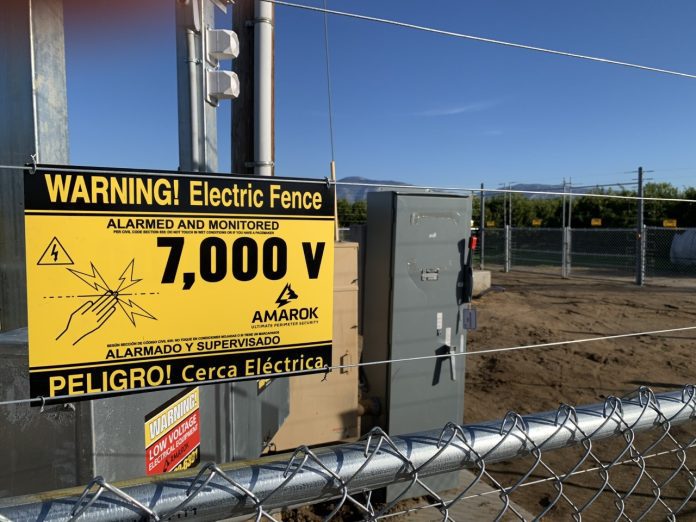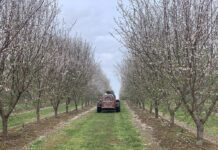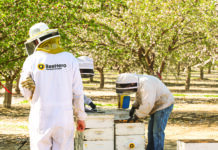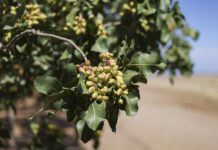Crime is a major expense for tree nut growers, whether it is the theft of a load of nuts, equipment theft, embezzlement or the latest scam. The perpetrator can be an employee or a contractor, or a complete stranger who visits the orchard in the middle of the night.
Fortunately, there are a few things a grower can do to prevent or reduce crime.
Know Your Employees
Growers should conduct background checks on all employees, according to Rocky Pipkin, president and managing general partner of Pipkin Detective Agency in Visalia, Calif.
“That’s where you start,” said Pipkin. “As an employer, you have to weed out repeat offenders.”
Information used to conduct a background check includes a prospective employee’s name, Social Security number, birthdate and residence. For about $40, a grower can use this information to search online records.
Security Equipment and Fences
The first thing Efrain Quiros, Jr., risk management services consultant with Nationwide Agribusiness, advises growers to consider is fencing and a good security system.
“I highly recommend a local alarm system,” he said, explaining a central station monitoring system that notifies local law enforcement is not as effective out on an orchard, miles away from that law enforcement.
“A local alarm that goes off and wakes everyone within five miles will usually scare thieves away,” Quiros said.
He also suggests growers use video cameras; however, he added cameras “don’t necessarily capture the necessary data.” A driver wearing a hoodie can be virtually impossible to identify on poor-quality videotape.
Quiros said growers should doublecheck their video security and outdoor lighting, and also make sure that the information is stored long enough. Video from some systems only lasts for 24 or 48 hours, while other systems provide information for 30 days, or “go on the web and stay forever.”
Keep an Eye on Everything
“In farming, you also deal with employee dishonesty,” said Quiros. “If your employees deal with money, they could be stealing that money.”
Some longtime tree nut growers have seen the value of their harvests increase dramatically in recent years as markets for nuts opened in other counties. As a result, older growers are vulnerable to having employees skim profits, for example, by showing that profits have doubled when they have actually tripled.
To prevent theft by employees, Quiros tells growers to do “simple things,” such as look at the books and the inventory on a day-to-day basis and “not rely so much on that son-in-law or nephew you’ve been depending on.”
He also advises growers to know the people who come onto their premises to do any work and always have written contracts.
“A lot of the issues we’ve been seeing for growers during harvest is the huge discrepancy between the number of employees and those reported,” said Pipkin, adding that local district attorneys “will go after contractors for overreporting the number of workers in the field.
“You’ve got to keep your eyes on everything,” he said. “In today’s world of online banking, you need to keep your eye on your bank account every day.”
According to Pipkin, red flags to watch for include money going “to companies you’ve never done business with before,” and an increase in credit card debt “above and beyond what is typical for your business.”
A common crime is when someone steals your checks and either alters them or uses the information to get into your bank account.
“You need to open up your mail every day,” he said. “You should even get a post office box.”
He explained that it is 90% more secure to get mail delivered to a post office box than it is to have it delivered to the mailbox at your business. Also, federal authorities get involved when mail is taken from a post office box.
Workplace Inspections
Pipkin recommends growers follow all the workplace rules of the Occupational Safety and Health Administration (OSHA), the part of the U.S. Department of Labor that makes sure an orchard has a safe working environment.
He suggests a private company be hired to conduct workplace safety inspections. This can prevent an employee from “blatantly providing false information that the employer did not have proper safety measures in place,” he said. “An inspection by private compliance inspectors can cut down on insurance fraud.”
Insurance companies will also send inspectors to determine how well a farm is protected from crime along with how safe the workplace is. If changes need to be made, the inspector will issue what are called ‘recommendations.’
“The insurance company calls them recommendations, but they’re mandatory,” explained Jason Mackey, agent/VP at Mackey and Mackey Insurance Agency in Hanford, Calif. “If my client doesn’t comply, it may impact their rating negatively. They may even get dropped.”
New Products
Many companies manufacture products that prevent or reduce ag crime. A few of them showcased their newest products at the recent California Rural Crime Prevention Task Force (CRCPTF) conference.
Cambridge Forensics, a division of Cambridge Federal, based in Punta Gorda, Fla., exhibited SmartTrace (formerly SmartWater), an odorless, colorless liquid that appears to be water and leaves no visible residue.
SmartTrace is invisible to the human eye, said Mike Ross, founder of Cambridge Forensics, the sole distributor of SmartTrace in the U.S.
“It’s up to the individual how they deploy the product,” he said. “It has a code that is exclusive to that customer.”
Pipkin tells tree nut growers to spray it on trucks that haul nuts to packers.
“We’ve had instances where people had access to trucks on the weekend and scammed 20% of the harvest,” he said, advising growers to spray it on “anything someone can take and use for themselves.”
Cambridge Forensics offers a security system that can spray SmartTrace on anyone opening a secured cabinet, locked storage room or safe. It can also be used to spray anyone who tries to steal a vehicle without first disarming the system.
“It stays on the body for eight weeks and on clothing forever,” said Ross.
The product has not been approved for human consumption by the FDA, so it should not be sprayed on nuts or husks. Current research may change that, however, and eventually allow SmartTrace to be used on nuts to identify where they were grown.
At the conference, Pipkin also noticed the electric fencing by Amarok, LLC. The Columbia, South Carolina-based company manufactures fences that do not have a sufficient shock to put anyone’s life at risk, “but you’re not going to feel good” after touching it. The warning sign on the electric fence around a tree nut orchard is often enough to deter theft.
“Criminals look at how can I get in, get what I want, and get out,” he said.
“The Electric Guard Dog Fence has been popular with the California Rural Crime Task Force because it’s a proven property crime deterrent,” said Keaton McPherson, regional account executive with Amarok. “Our 7,000-volt electric fence serves as a physical and shocking deterrent for anyone looking to gain access to nut property.”
Real-time alerts notify law enforcement when and where the attempted breach is happening, he added.
“From catalytic converter, fuel and diesel, and equipment theft to vandalism and arson, there are several property crime challenges threatening nut production today,” said McPherson.
“Take the rise in copper theft, for example, driving criminals to target agricultural irrigation systems. The average incident could cost producers between $7,000 to $50,000 in repairs depending on the extent of the damage. This doesn’t account for the crops potentially lost to drought in the meantime.”
Vehicle Theft
“A loaded trailer is a mistake to leave out overnight,” said Quiros. “An individual comes with a semi, hitches to it and drives off. We had a lot of thefts a while back doing exactly that.
“Don’t leave vehicles out at night,” he said, but then added if you do, “at least don’t leave the keys.”
To increase the chances stolen vehicles will be returned, Quiros suggests all vehicles have some sort of marking to identify them, such as a steel plate welded to the vehicle. A GPS device can help you to locate a stolen vehicle. Both suggestions, however, are much more helpful in recovering a vehicle than in preventing its theft.
Need a Detective?
Calling a detective can help a tree nut grower solve certain crimes. When necessary, they can even assemble a team of investigators who can focus on a grower’s specific concern. However, according to Pipkin, most of the time a grower is better off reaching out to local law enforcement instead.
“When someone contacts us, our first question is, ‘Have you contacted the ag unit of local law enforcement?’” said Pipkin. “Most stuff they can do.”
















